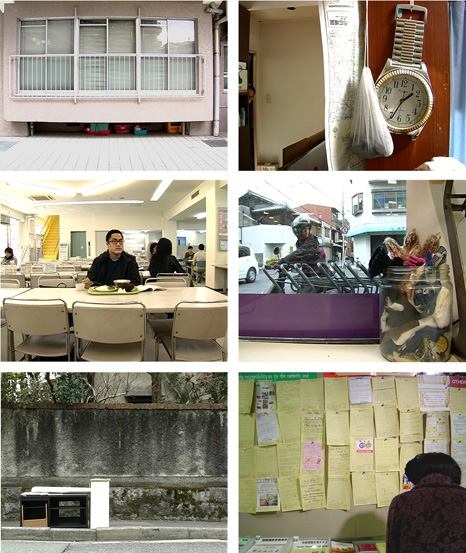
このプロジェクトは、「passing通用すること」−周囲の人に気づかれないように特定の場所に入り込もうとすること、失敗すると解っていな がらも京都 の日常生活に忍び込もうとすること‐の問いかけとして開始されました。しかし、「言語」、そして「出自」に対する問いかけは、よりいっそうアイデンティ ティ意識を高めることになり、そして「passing」は「passing back and forthやりとりをすること」といった意味でより私の関心をひくようになりました。言語や意味の交換は、私にとって人やもの、場所の間の距離をたどる ための手段となったのです。どこへ行こうとも−アーバン・プランナー、旅行者、あるいは地元住民、どのような者としてであれ−、私たちは自 身を取り巻く環境と関係を取り結ぼうとする 生来の、そして本能的なマッピング・プロセスを持っています。しかし、地図が私たちにもたらす最大の錯覚とは、土地は整然とした図面や格子で表現され、川 は図式化された形として表現されているにも関わらず、そこに信頼性や具体的な客観性があると思わせてしまうことです。実際、都市の表象としての地図は、空 間に固定された地点の軌跡であるが故に「物語」の多様性を示しているともいえるのです。したがって、京都を学ぶことは、実際の変数を知るというより、同時 に起こる「活動の結果」について知ることになるのです。同じ意味において、アイデンティティは行為に基礎を置いています。ミシェル・ド・セ ルトーは「何かをしようとする意志(un vouloir-faire)」によって人間を評価します。そしてその意志は私たちが、普段繊細なメタ・コミュニケーションの中でバランスをとっている現 実と願望、ありのままのものと加工されたもの、伝えられたものと受け取られたものの間にあるギャップにあると私は考えます。そこでは、かつて確実性を持っ てとらえられていた時間と場所はもはや確実性を失うのです。‐そして、私たちは日々円を描いているのです。This project began as a question of ‘passing’, of trying to insert oneself into the situation invisibly, of slipping into the daily life of Kyoto in a premeditated failure of assimilation. But very quickly, language and the question of nativity led to a much more relational sense of identification, and ‘passing’ became much more interesting in the sense of ‘passing back and forth’. Language and the exchange of meaning became the tools with which to trace the distances between person, object and place.Wherever we go, whether as tourist, native resident or urban planner, there is an inherent and instinctive mapping process with which we engage our surroundings. But the greatest illusion of the map, however, is its misleading sense of authority, of concrete objectivity in the face of a neatly laid out plan, a grid or a logically designed river. In fact, the map, as an image of the city, is a multiplicity of narratives inasmuch as it is a trajectory of points fixed in space. To learn about Kyoto becomes less about a real mapped variable than a simultaneous ‘result of activities’.In the same sense, identity becomes based upon production. de Certeau measures being by “un vouloir-faire”, or will to do, and it is within these gaps between reality and aspiration, natural and fabricated or transmitted and received that we find the rhythms of a delicate meta-communication. The former rooted-ness of time and place are no longer valid. We walk in circles everyday.
